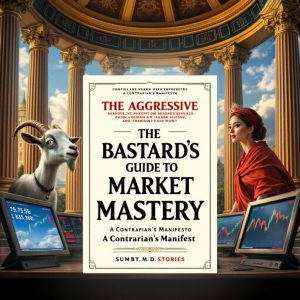
Understanding Current Market Volatility
Oct 09, 2024
Current market volatility refers to the rapid and significant price fluctuations in financial markets. This phenomenon can be attributed to various factors, including economic uncertainty, geopolitical events, and shifts in investor sentiment. While experts often attempt to predict and explain these fluctuations, their effectiveness is frequently questioned.
The ancient Chinese philosopher Lao Tzu (6th century BC) observed, “Those who know, don’t predict. Those who predict don’t know.” This wisdom resonates strongly when considering the role of experts in navigating current market volatility.
The Fallibility of Expert Predictions
Despite their credentials and experience, financial experts often fail to accurately predict market movements, especially during periods of heightened volatility. This shortcoming can be attributed to financial markets’ complex and usually unpredictable nature and the cognitive biases that affect even the most seasoned professionals.
As the renowned investor Warren Buffett once quipped, “Forecasts may tell you a great deal about the forecaster; they tell you nothing about the future.” This statement highlights the inherent limitations of expert predictions in the face of current market volatility.
Mass Psychology and Market Volatility
Mass psychology plays a crucial role in shaping current market volatility. Investor emotions like fear and greed can lead to exaggerated market movements that defy logical explanations. These collective behaviours often render expert analyses ineffective, as markets can deviate significantly from fundamental valuations.
Gustave Le Bon, a prominent sociologist of the late 19th century, noted, “The masses have never thirsted after truth. They turn aside from evidence not to their taste, preferring to deify error if error seduces them.” This observation underscores the challenge of applying rational analysis to markets driven by collective emotions.
The Role of Cognitive Biases in Market Volatility
Cognitive biases are at the heart of market irrational behaviour, fueling wild price swings and deepening uncertainty. These mental shortcuts—built into human decision-making—often bypass logical thinking, pushing novice investors and seasoned professionals into poor choices. In high-stakes environments like the stock market, cognitive biases can turn subtle market shifts into seismic events.
Take confirmation bias, for instance. This bias drives investors to seek data that reinforces their beliefs while dismissing opposing views, skewing their interpretation of market signals. Imagine an investor who’s convinced that a particular tech stock will soar. Instead of weighing warning signs of an impending downturn, they focus only on the success stories surrounding the company, leading to overconfidence and a risky position. This distorted view inflates market trends, making volatility even more pronounced.
Daniel Kahneman, a Nobel laureate in economics, stressed how cognitive biases warp our sense of control in uncertain markets. He observed that our tendency to overestimate our ability to predict the future is rooted in the comforting—but flawed—illusion that we understand the past. This overconfidence heightens volatility as more investors fall into the trap of thinking they can outsmart the market, only to react emotionally when the unexpected occurs.
Technical Analysis: A Flawed Approach to Predicting Volatility?
Technical analysis, the art of reading past price movements and patterns to predict future trends, can seem like a beacon of rationality in volatile times. However, its effectiveness during unpredictable market shifts is often limited, as it overlooks the psychological and emotional factors that drive sudden price movements.
While technical indicators like moving averages or the MACD might signal potential trends, they fail to account for black swan events—unforeseen crises like a geopolitical shock or a pandemic outbreak that can send markets spiralling. For instance, during the 2008 financial crisis, most technical indicators warned little about the upcoming collapse. As Benoit Mandelbrot, a pioneer of fractal geometry, remarked, “Markets are incredibly complex, and predicting them with any certainty is nearly impossible.”
Even in calmer times, over-reliance on historical data ignores that markets are made up of human participants driven by emotion. When panic strikes, technical patterns often crumble under collective fear, leaving traders relying solely on charts exposed to enormous risk.
The Illusion of Control in Volatile Markets
Experts often exude confidence when making market forecasts, but this confidence can be misleading—especially in volatile times when even the best predictions can unravel. Investors tend to place too much trust in these forecasts, seduced by the illusion that market outcomes are predictable.
This overconfidence is encapsulated by what psychologists call the *illusion of control*, where we overestimate our influence over random or uncertain events. This phenomenon is particularly dangerous in financial markets, where factors like herd behaviour or unexpected economic shifts can throw off even the most accurate analysis. Investors who cling to expert predictions often find themselves blindsided by unexpected volatility.
Socrates’ timeless wisdom—”The only true wisdom is in knowing you know nothing”—captures the humility sorely lacking in modern financial discourse. In volatile markets, admitting uncertainty can be far more valuable than pretending to control the uncontrollable. Experts who recognize the complexity and unpredictability of markets provide a more balanced view, steering investors away from blind optimism or fear-based selling.
The Herd Mentality and Its Impact on Market Volatility
Herd mentality can turn markets into a frenzy, overriding rational decision-making and plunging prices into extreme highs or lows. In times of volatility, investors often follow the crowd, convinced that others must know something they don’t. This can create massive price surges or collapses independent of actual market fundamentals.
A classic example is the dot-com bubble of the late 1990s. Investors flooded into internet stocks, driven by the fear of missing out (FOMO) rather than careful analysis. Even warnings from cautious experts couldn’t stop the stampede. When the bubble finally burst, trillions in market value evaporated almost overnight, leaving behind the stark reality of herd-driven excess.
Similarly, during the GameStop frenzy of 2021, herd mentality amplified stock prices as retail investors piled in, coordinated by online forums. The rush to buy defied all expert warnings of overvaluation. As the market swung violently, volatility surged to extreme levels, underscoring how collective emotion can upend even the most grounded specialist analysis.
The Value of Contrarian Thinking in Volatile Markets
Given the limitations of expert predictions and the influence of mass psychology, contrarian thinking can be a valuable approach during periods of current market volatility. By going against the prevailing market sentiment, investors may be able to capitalize on opportunities created by irrational price movements.
Sir John Templeton, a renowned investor, advised, “The time of maximum pessimism is the best time to buy, and the time of maximum optimism is the best time to sell.” This contrarian approach challenges the often misguided consensus views propagated by many experts during volatile markets.
The Importance of Individual Research and Critical Thinking
Rather than relying solely on expert opinions, investors navigating current market volatility may benefit from conducting their research and developing critical thinking skills. This approach allows for a more nuanced understanding of market dynamics and helps mitigate the influence of cognitive biases.
Benjamin Franklin, one of America’s founding fathers, emphasized the importance of self-reliance, stating, “An investment in knowledge pays the best interest.” This wisdom encourages investors to actively participate in their financial education rather than passively accepting expert pronouncements.
The Role of Diversification in Managing Volatility
While experts may struggle to predict market movements accurately, the principle of diversification remains a valuable tool for managing current market volatility. By spreading investments across various asset classes and sectors, investors can reduce their exposure to extreme price fluctuations in any area.
The ancient Talmudic sage Rabbi Isaac bar Aha (3rd century AD) provided timeless advice on diversification, stating, “A person should always divide his money into three parts: one-third in land, one-third in merchandise, and one-third at hand.” This principle of diversification remains relevant in modern portfolio management.
Instead of seeking certainty from expert predictions, investors may benefit from embracing the inherent uncertainty of volatile markets. This mindset allows for more flexible and adaptive investment strategies that can better respond to rapidly changing market conditions.
The philosopher Nassim Nicholas Taleb advocates this approach, stating, “The inability to predict outliers implies the inability to predict the course of history.” By acknowledging forecasting’s limitations, investors can focus on building resilient portfolios rather than chasing elusive predictions
Conclusion: Navigating Volatility with Wisdom and Humility
In the face of current market volatility, the limitations of expert predictions become increasingly apparent. The complex interplay of mass psychology, cognitive biases, and unpredictable events renders many forecasts ineffective or even misleading. Instead of relying on these often-flawed predictions, investors may benefit from adopting a more humble and flexible approach to market analysis.
By combining timeless wisdom from historical thinkers with modern insights into market behaviour, investors can develop a more nuanced understanding of volatility. This approach emphasizes critical thinking, diversification, and an acceptance of uncertainty as key elements in navigating turbulent markets.
As the ancient Roman philosopher Seneca (4 BC – 65 AD) wisely noted, “It is not because things are difficult that we do not dare; it is because we do not dare that things are difficult.” In the context of current market volatility, this insight encourages investors to approach challenges with courage and wisdom rather than seeking false comfort in expert predictions.
Captivating Articles That Leave a Lasting Impression

Unleash Your Financial Destiny: Defy the Herd and Win

Market Complacency: From Pain to Profit—Here’s How to Fix It

What triggered the stock market panic of 1873?

Is stock market volatility today engineered by insiders?

Paradox of prosperity definition

Death cross vs Golden cross

Why should I invest in Google?

What is the October Effect? Myth, Market Moves, and the Real Story

Why should I invest in Amazon?

If You Choose a Passive Investing Strategy, How Will Your Portfolio Look with Its First Allocation? Let’s See

Second Level Thinking: How to Use It in Investing to Truly Thrive

How does the gambler’s fallacy definition reveal our flawed thinking about probability?

Why Should I Invest in the Market? Your Best Path to Winning

Stock Market Winning Strategy: Start by Going Against the Grain



